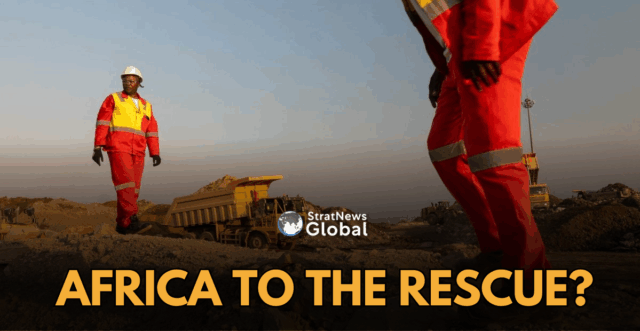As global powers scramble for critical minerals, African countries are pushing for new investment to process more of their own raw materials and meet their people’s demands for economic growth and jobs, analysts say.
To capitalise on the burgeoning demand, the continent must address power shortages, skills gaps, trade barriers, and limited industrial capacity.
“This is an unprecedented opportunity for Africa to get on the value-chain bandwagon,” said Hany Besada, senior fellow at the Firoz Lalji Institute for Africa at the London School of Economics and associate professor at the Wits School of Governance.
Africa has around 30% of the world’s mineral reserves, including cobalt, lithium, and nickel.
The International Energy Agency expects lithium demand to grow fivefold by 2040, graphite and nickel demand to double, and demand for cobalt and rare earth elements to increase by 50% to 60% by 2040.
African Resources
Africa needs to “build local value chains that integrate mining with refining and manufacturing and innovation, and this goes hand-in-hand with the green transformation of the continent’s economies,” Besada said.
For example, Zimbabwe, Africa’s top lithium producer, has been nudging mining companies to process the minerals in the country to help lift its economy.
“We are creating new jobs, not only in the mining sector, but in the value addition of our minerals,” Evelyn Ndlovu, minister of environment, climate, and wildlife, told the Thomson Reuters Foundation. “We have got a lot of people coming in to invest in Zimbabwe.”
China’s Zhejiang Huayou Cobalt said in October it would start producing lithium sulphate during the first quarter of 2026 from its new $400 million plant in Zimbabwe.
At the United Nations’ COP30 climate talks in Brazil in November, African countries hope to win support, especially from the Global South, to ensure demand for the minerals fuelling the digital economy and clean energy transition translates into growth, jobs, and development.
Africa “wants to be a meaningful participant and beneficiary of the green economy,” said Ibrahima Aidara, deputy Africa director at the National Resource Governance Institute.
“That means an industrial policy that creates jobs, protects rights, and enables countries to climb the value chain and not be trapped at the bottom.”
Hurdles For Africa
Aidara pointed to the Democratic Republic of Congo, which supplies 70% of the world’s cobalt, as an example of a country where mineral wealth has led to child labour, displacement, and armed conflict.
Across Africa, barriers to mineral processing – called beneficiation – include a lack of electricity, high tariffs between African countries, infrastructure gaps, and cumbersome customs procedures.
“Addressing barriers to trade is critical … If you don’t do that, efforts towards (mineral) beneficiation and industrialisation remain aspirational,” Besada said.
Regional cooperation is also key, including initiatives like the African Continental Free Trade Area (AfCFTA), designed to unify all 1.4 billion people in more than 50 nations into a single market.
Tariff Push
U.S. President Donald Trump’s imposition of tariffs could give momentum to the AfCFTA, which was officially launched in 2021 but has less than half of its member states actively trading under the framework.
The African Union’s Green Minerals Strategy, launched this year, and the Lobito Corridor railway, which connects Zambia’s copper belt to Angola’s Atlantic coast, are examples of cooperation that can help make Africa more than a mere supplier.
In West Africa, the minerals boom has sparked a resurgence of resource nationalism, with countries, particularly military regimes like the one in bauxite-rich Guinea, imposing conditions on foreign mining companies to force value addition.
But Aidara said this approach might not ensure lasting benefits to local communities.
“This problem … is bigger than individual countries. We believe at the national level we need … well-defined and evidence-based strategies to leverage minerals and create more economic and industrialisation opportunities.”
(with inputs from Reuters)





